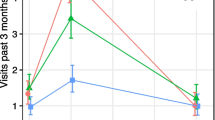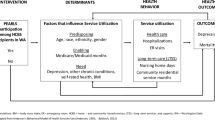Abstract
To evaluate the impact of a community health worker intervention (CHW) (referred to as Personalized Support for Progress (PSP)) on all-cause health care utilization and cost of care compared with Enhanced Screening and Referral (ESR) among women with depression. A total of 223 patients (111 in PSP and 112 in ESR randomly assigned) from three women’s health clinics with elevated depressive symptoms were enrolled in the study. Their electronic health records were queried to extract all-cause health care encounters along with the corresponding billing information 12 months before and after the intervention, as well as during the first 4-month intervention period. The health care encounters were then grouped into three mutually exclusive categories: high-cost (> US$1000 per encounter), medium-cost (US$201–$999), and low-cost (≤ US$200). A difference-in-difference analysis of mean total charge per patient between PSP and ESR was used to assess cost differences between treatment groups. The results suggest the PSP group was associated with a higher total cost of care at the baseline; taking this baseline difference into account, the PSP group was associated with lower mean total charge amounts (p = 0.008) as well as a reduction in the frequency of high-cost encounters (p < 0.001) relative to the ESR group during the post-intervention period. Patient-centered interventions that address unmet social needs in a high-cost population via CHW may be a cost-effective approach to improve quality of care and patient outcomes.

Similar content being viewed by others
References
Bauer A, Knapp M, Parsonage M (2016) Lifetime costs of perinatal anxiety and depression. J Affect Disord 192:83–90. https://doi.org/10.1016/j.jad.2015.12.005
Berwick DM, Nolan TW, Whittington J (2008) The triple aim: care, health, and cost. Health Aff (Millwood) 27:759–769. https://doi.org/10.1377/hlthaff.27.3.759
Bhaumik U, Norris K, Charron G, Walker SP, Sommer SJ, Chan E, Dickerson DU, Nethersole S, Woods ER (2013) A cost analysis for a community-based case management intervention program for pediatric asthma. J Asthma 50:310–317. https://doi.org/10.3109/02770903.2013.765447
Bruffaerts R, Vilagut G, Demyttenaere K, Alonso J, Alhamzawi A, Andrade LH, Benjet C, Bromet E, Bunting B, de Girolamo G, Florescu S, Gureje O, Haro JM, He Y, Hinkov H, Hu C, Karam EG, Lepine JP, Levinson D, Matschinger H, Nakane Y, Ormel J, Posada-Villa J, Scott KM, Varghese M, Williams DR, Xavier M, Kessler RC (2012) Role of common mental and physical disorders in partial disability around the world. Br J Psychiatry 200:454–461. https://doi.org/10.1192/bjp.bp.111.097519
Carroll JK, Humiston SG, Meldrum SC, Salamone CM, Jean-Pierre P, Epstein RM, Fiscella K (2010) Patients’ experiences with navigation for cancer care. Patient Educ Couns 80:241–247. https://doi.org/10.1016/j.pec.2009.10.024
Casey P, Goolsby S, Berkowitz C, Frank D, Cook J, Cutts D, Black MM, Zaldivar N, Levenson S, Heeren T, Meyers A (2004) Maternal depression, changing public assistance, food security, and child health status. Pediatrics 113:298–304. https://doi.org/10.1542/peds.113.2.298
Chechulin Y, Nazerian A, Rais S, Malikov K (2014) Predicting patients with high risk of becoming high-cost healthcare users in Ontario (Canada). Healthc Policy 9:68–79 https://www.ncbi.nlm.nih.gov/pmc/articles/PMC3999564/
Chiu M, Lebenbaum M, Cheng J, de Oliveira C, Kurdyak P (2017) The direct healthcare costs associated with psychological distress and major depression: a population-based cohort study in Ontario, Canada. PLoS One 12:e0184268. https://doi.org/10.1371/journal.pone.0184268
Enard KR, Ganelin DM (2013) Reducing preventable emergency department utilization and costs by using community health workers as patient navigators. J Healthc Manag 58:412–427 discussion 428 https://www.ncbi.nlm.nih.gov/pmc/articles/PMC4142498/
Fitzpatrick T, Rosella LC, Calzavara A, Petch J, Pinto AD, Manson H, Goel V, Wodchis WP (2015) Looking beyond income and education: socioeconomic status gradients among future high-cost users of health care. Am J Prev Med 49:161–171. https://doi.org/10.1016/j.amepre.2015.02.018
Freeman HP, Rodriguez RL (2011) History and principles of patient navigation. Cancer 117:3539–3542. https://doi.org/10.1002/cncr.26262
Garg A, Toy S, Tripodis Y, Cook J, Cordella N (2015) Influence of maternal depression on household food insecurity for low-income families. Acad Pediatr 15:305–310. https://doi.org/10.1016/j.acap.2014.10.002
Greenberg PE, Fournier AA, Sisitsky T, Pike CT, Kessler RC (2015) The economic burden of adults with major depressive disorder in the United States (2005 and 2010). J Clin Psychiatry 76:155–162. https://doi.org/10.4088/JCP.14m09298
Greenberg PE, Kessler RC, Birnbaum HG, Leong SA, Lowe SW, Berglund PA, Corey-Lisle PK (2003) The economic burden of depression in the United States: how did it change between 1990 and 2000? J Clin Psychiatry 64:1465–1475. https://doi.org/10.4088/jcp.v64n1211
Han HR, Lee H, Kim MT, Kim KB (2009) Tailored lay health worker intervention improves breast cancer screening outcomes in non-adherent Korean-American women. Health Educ Res 24:318–329. https://doi.org/10.1093/her/cyn021
Hildebrandt E, Stevens P (2009) Impoverished women with children and no welfare benefits: the urgency of researching failures of the temporary assistance for needy families program. Am J Public Health 99(5):793–801. https://doi.org/10.2105/AJPH.2006.106211
Johnson TL, Rinehart DJ, Durfee J, Brewer D, Batal H, Blum J, Oronce CI, Melinkovich P, Gabow P (2015) For many patients who use large amounts of health care services, the need is intense yet temporary. Health Aff (Millwood) 34:1312–1319. https://doi.org/10.1377/hlthaff.2014.1186
Karnick P, Margellos-Anast H, Seals G, Whitman S, Aljadeff G, Johnson D (2007) The pediatric asthma intervention: a comprehensive cost-effective approach to asthma management in a disadvantaged inner-city community. J Asthma 44:39–44. https://doi.org/10.1080/02770900601125391
Merikangas KR, Ames M, Cui L, Stang PE, Ustun TB, Von Korff M, Kessler RC (2007) The impact of comorbidity of mental and physical conditions on role disability in the US adult household population. Arch Gen Psychiatry 64:1180–1188. https://doi.org/10.1001/archpsyc.64.10.1180
Narain K, Bitler M, Ponce N, Kominski G, Ettner S (2017) The impact of welfare reform on the health insurance coverage, utilization and health of low education single mothers. Soc Sci Med 180:28–35. https://doi.org/10.1016/j.socscimed.2017.03.021
Natale-Pereira A, Enard KR, Nevarez L, Jones LA (2011) The role of patient navigators in eliminating health disparities. Cancer 117:3543–3552. https://doi.org/10.1002/cncr.26264
Petereit DG, Molloy K, Reiner ML, Helbig P, Cina K, Miner R, Spotted Tail C, Rost C, Conroy P, Roberts CR (2008) Establishing a patient navigator program to reduce cancer disparities in the American Indian communities of Western South Dakota: initial observations and results. Cancer Control 15:254–259. https://doi.org/10.1177/107327480801500309
Poleshuck E, Wittink M, Crean H, Gellasch T, Sandler M, Bell E, Juskiewicz I, Cerulli C (2015) Using patient engagement in the design and rationale of a trial for women with depression in obstetrics and gynecology practices. Contemp Clin Trials 43:83–92 doi:https://doi.org/10.1016/j.cct.2015.04.010
Poleshuck E, Wittink M, Crean HF, Juskiewicz I, Bell E, Harrington A, Cerulli C (2019) A comparative effectiveness trial of two patient-centered interventions for women with unmet social needs: Personalized Support for Progress and Enhanced Screening and Referral. J Womens Health (Larchmt). https://doi.org/10.1089/jwh.2018.7640
Rousseau SJ, Humiston SG, Yosha A, Winters PC, Loader S, Luong V, Schwartzbauer B, Fiscella K (2014) Patient navigation moderates emotion and information demands of cancer treatment: a qualitative analysis. Support Care Cancer 22:3143–3151. https://doi.org/10.1007/s00520-014-2295-z
Rush CH (2012) Return on investment from employment of community health workers. J Ambul Care Manage 35:133–137. https://doi.org/10.1097/JAC.0b013e31822c8c26
Ryan RM, Deci EL (2000) Self-determination theory and the facilitation of intrinsic motivation, social development, and well-being. Am Psychol 55:68–78. https://doi.org/10.1037//0003-066x.55.1.68
Sadowski LS, Kee RA, VanderWeele TJ, Buchanan D (2009) Effect of a housing and case management program on emergency department visits and hospitalizations among chronically ill homeless adults: a randomized trial. Jama 301:1771–1778. https://doi.org/10.1001/jama.2009.561
Taylor LA, Tan AX, Coyle CE, Ndumele C, Rogan E, Canavan M, Curry LA, Bradley EH (2016) Leveraging the social determinants of health: what works? PLoS One 11:e0160217. https://doi.org/10.1371/journal.pone.0160217
Toy S, Tripodis Y, Yang K, Cook J, Garg A (2016) Influence of maternal depression on WIC participation in low-income families. Matern Child Health J 20:710–719. https://doi.org/10.1007/s10995-015-1871-2
Ustun TB, Ayuso-Mateos JL, Chatterji S, Mathers C, Murray CJ (2004) Global burden of depressive disorders in the year 2000. Br J Psychiatry 184:386–392. https://doi.org/10.1192/bjp.184.5.386
Wammes JJG, van der Wees PJ, Tanke MAC, Westert GP, Jeurissen PPT (2018) Systematic review of high-cost patients’ characteristics and healthcare utilisation. BMJ Open 8:e023113. https://doi.org/10.1136/bmjopen-2018-023113
Woods ER, Bhaumik U, Sommer SJ, Ziniel SI, Kessler AJ, Chan E, Wilkinson RB, Sesma MN, Burack AB, Klements EM, Queenin LM, Dickerson DU, Nethersole S (2012) Community asthma initiative: evaluation of a quality improvement program for comprehensive asthma care. Pediatrics 129:465–472. https://doi.org/10.1542/peds.2010-3472
Zook CJ, Moore FD (1980) High-cost users of medical care. N Engl J Med 302:996–1002. https://doi.org/10.1056/nejm198005013021804
Acknowledgments
We gratefully acknowledge the support from the University of Rochester School of Medicine’s Babigian Summer Research Fellowship and the Department of Psychiatry for funding the cost analysis; we also acknowledge and thank the Patient Centered Outcomes Research Institute, AD-12-4261, for funding the randomized comparative effectiveness trial.
Author information
Authors and Affiliations
Corresponding author
Ethics declarations
The University of Rochester’s Institutional Review Board reviewed and approved this study. All aspects of this study where performed in accordance with institutional ethical standards and informed consent was obtained from all individual participants included in the study.
Conflict of interest
The authors declare that they have no conflict of interest.
Additional information
Publisher’s note
Springer Nature remains neutral with regard to jurisdictional claims in published maps and institutional affiliations.
Rights and permissions
About this article
Cite this article
Embick, E.R., Maeng, D.D., Juskiewicz, I. et al. Demonstrated health care cost savings for women: findings from a community health worker intervention designed to address depression and unmet social needs. Arch Womens Ment Health 24, 85–92 (2021). https://doi.org/10.1007/s00737-020-01045-9
Received:
Accepted:
Published:
Issue Date:
DOI: https://doi.org/10.1007/s00737-020-01045-9




